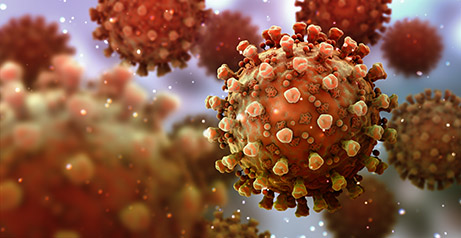
Two research teams – one that aims to better understand the lingering condition known as “long COVID” and one that will study COVID-19 at the cellular level – have received funding from the Canadian Institutes of Health Research (CIHR).
Long COVID, the post-COVID-19 syndrome that some patients experience, is poorly defined, says Dr. Alan Katz [M.Sc./95], director of the Manitoba Centre for Health Policy (MCHP) and professor of community health sciences and family medicine in the Max Rady College of Medicine.
“Clinicians just don’t know enough about it,” says Katz, who leads the project. “I’m hoping we can shine a light on these long-term effects of COVID-19 in a way that can help people deal with this in the future.”
When a person visits their family doctor with post-COVID symptoms such as fatigue, shortness of breath or cough, it’s not easy for the physician to diagnose the syndrome because there is no test to confirm it, Katz says.
The goal of the study, which received $202,000 from the CIHR for one year, is to help define the risk factors, determine who is more likely to get long COVID and describe the long-term effects of the syndrome.
The researchers want to define the kinds of symptoms people are reporting, determine how frequent those symptoms are and provide guidance for diagnosing the condition.
To do this, they will study anonymized health data from the Manitoba Population Research Data Repository held at the MCHP. The researchers will zero in on patients with a COVID-19 diagnosis and follow them, analyzing whether there is an increase in doctor visits and tracking their symptoms.
Dr. Ruey-Chyi Su co-leads a team that will investigate how the binding of the spike proteins of various coronavirus variants to the host-cell receptor known as ACE2 affects viral spread and mortality rates.
Little is known about what happens inside cells when the spike protein engages the receptor ACE2, says Su, a research scientist at the Public Health Agency of Canada and adjunct professor of medical microbiology and infectious diseases at UM.
“This is a much-understudied area,” Su says. “This grant allows us to study whether the engagement of coronavirus variants with ACE2 triggers different sets of events inside the infected cells, leading to increased viral replication and influencing the severity of the disease.”
The study, funded by $430,000 from the CIHR for one year, aims to profile molecular changes caused by the viral spike protein binding to the receptor and to identify the changes that are unique to the spike protein of each variant.
These changes will be examined in cells from both men and women to determine whether sex has any influence.
The researchers also want to know if the cells of healthy people respond differently to the virus binding to the receptor than the cells of people with chronic diseases, such as diabetes.
“The project will increase our knowledge of what to expect during a viral infection and also provide knowledge that might lead to treatments,” Su says.
BY MATTHEW KRUCHAK
